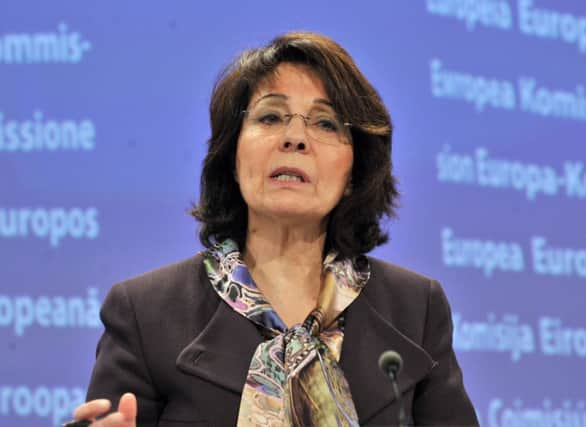EU leadership battle begins as UK begged to stay


During talks in Brussels late on Tuesday night, the Prime Minister made clear he would not back the front runner vying to take the European Union’s top job, and other leaders agreed they should look around for more candidates.
Jean-Claude Juncker, an EU veteran with federalist ambitions, had arrived in Brussels signalling he wanted immediate official backing to succeed Jose Manuel Barroso as European Commission president later this year.
Advertisement
Hide AdAdvertisement
Hide AdBut Mr Cameron indicated he was opposed to the move and sources said there was “willingness and encouragement” for rivals to be found.
Greek commissioner Maria Damanaki said the EU needed the UK to remain a member.
She said: “We need the UK. We cannot afford for the United Kingdom to go away. Because this can be the start of a process that can end up with the dilution of the whole EU.
“Free movement of people is a milestone in European ideas. I don’t think we can change the principle but in this framework there is a big margin for national governments to take the proper measures.
“The time is absolutely critical. Nobody here thinks we can go on with business as usual. So the message is received by everybody.”
She called for a “better Europe, closer to its citizens” by finding solutions to the real problems of unemployment, poverty and social cohesion.
“These are the issues that led to this eurosceptic, sometimes europhobic, vote so we need an action plan here. This is what we have to focus on,” she added.
“We need to find common ground.”
Labour MP Frank Field, who chairs the cross-party group on balanced migration, called for an end to the free movement of people and insisted there needed to be limits.
Advertisement
Hide AdAdvertisement
Hide AdHe said it was not necessarily a case of leaving the EU but negotiating on key issues for reform ahead of a referendum.
He said: “What we ought to be drawing up in this country is what I would call the red and blue lines – the minimum negotiations that we want.
“Certainly, the free movement of labour is part of that but also how law is interpreted and developed by judges way beyond what was originally envisaged.
“There are a whole range of issues I think we need to get clear for serious negotiation… Then those negotiations do need to be put to people in a referendum.
“If those negotiations go well, I think people will vote to stay. If they look as though the skirmishes were not serious at all in these renegotiations, then there is a possibility we might actually look for a much looser association.
“I’m not arguing there should be no movement… but when we signed up to this it was a treaty between countries with a very similar standard of living. Therefore there wasn’t much movement because there wasn’t much point.
“If you then extend that to countries which may have only a sixth of the value of the standard of living we have in this country, you risk huge movements of labour.
“If you look at what has happened since 1997, we have had something like four million people come, a million in London.”